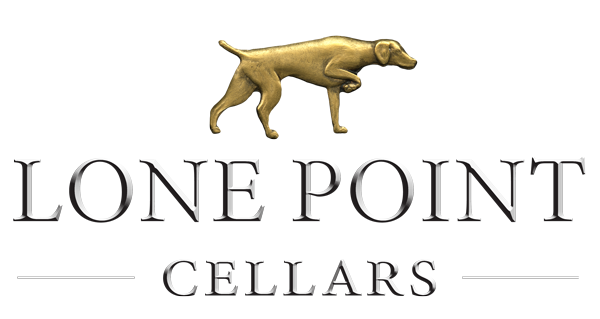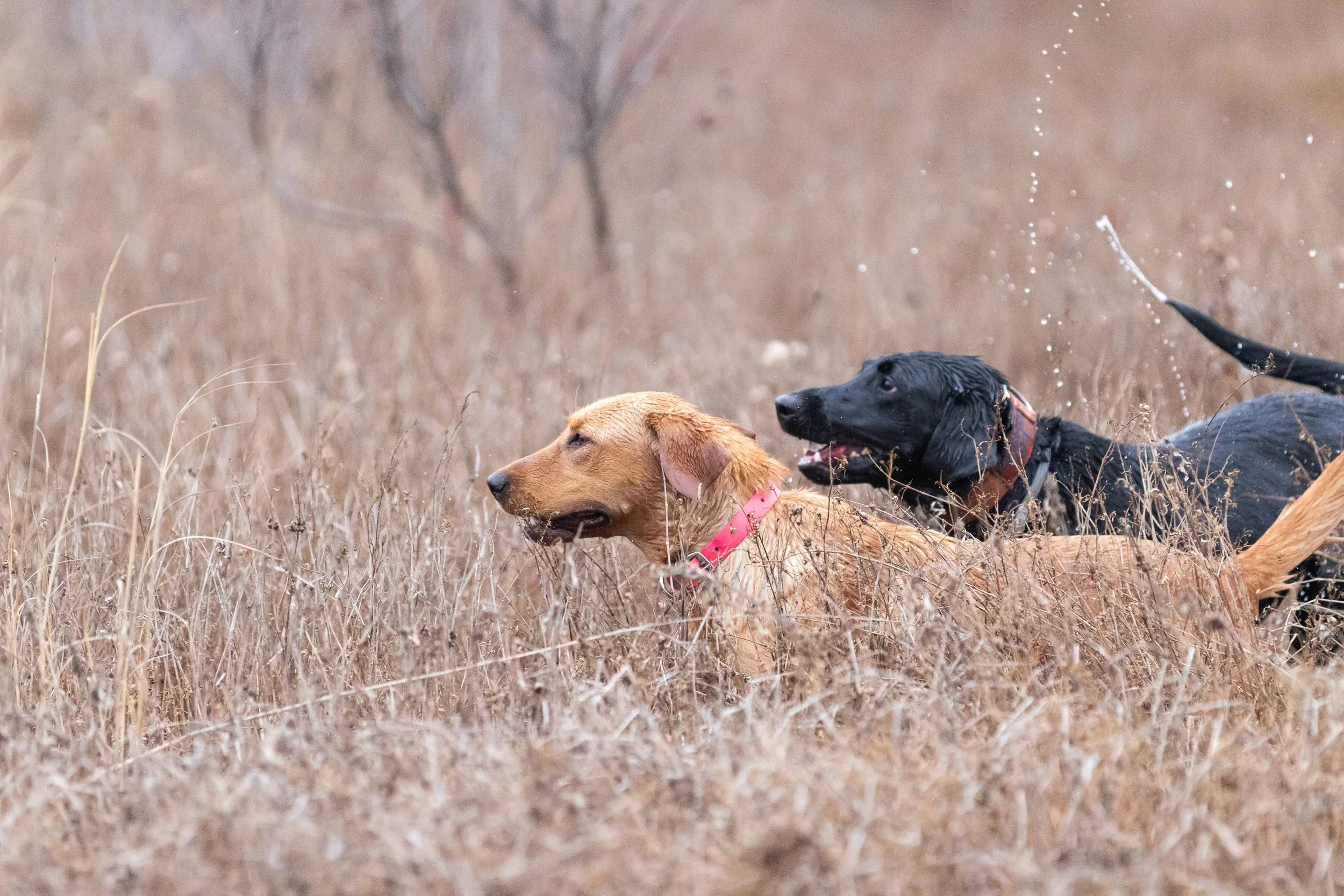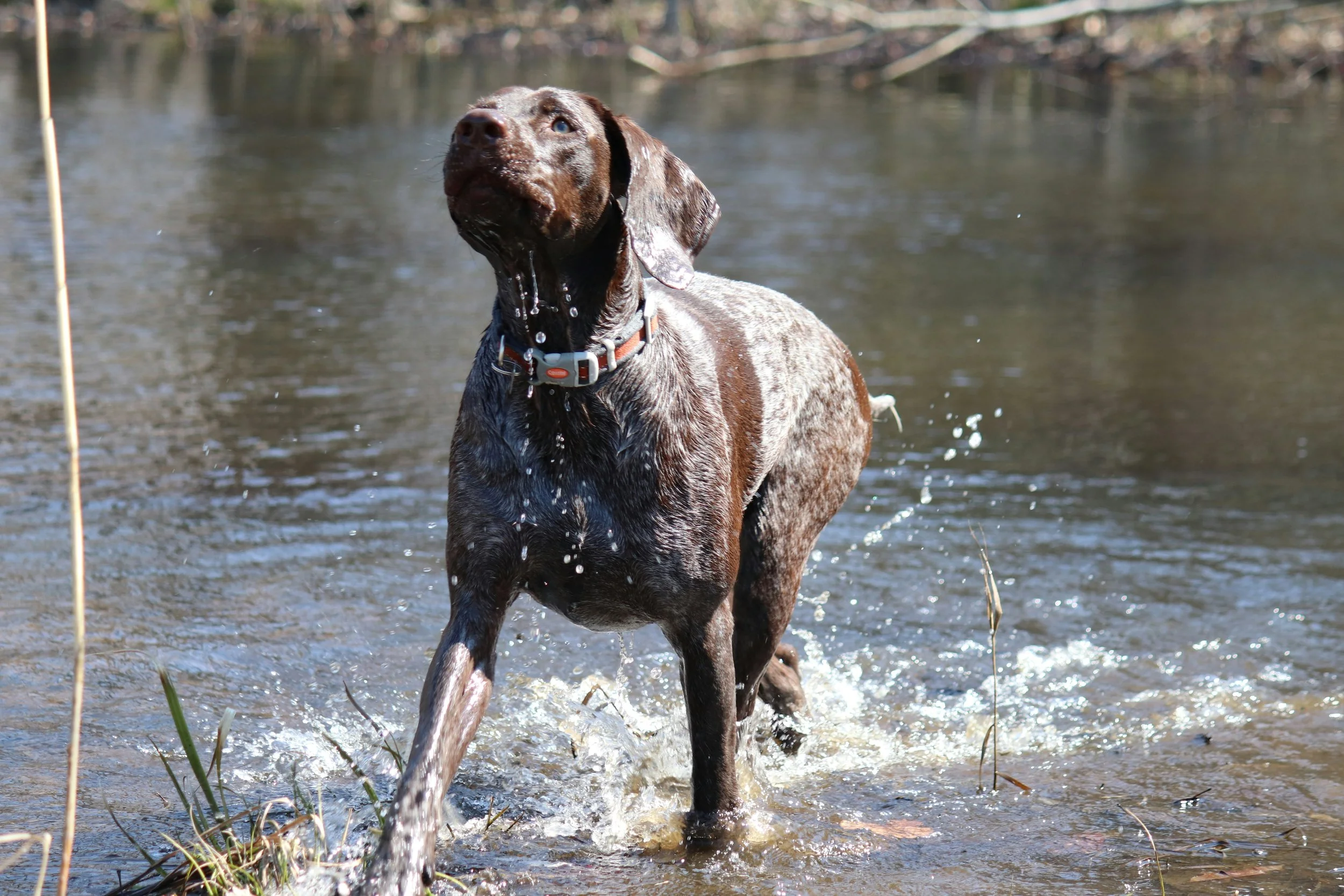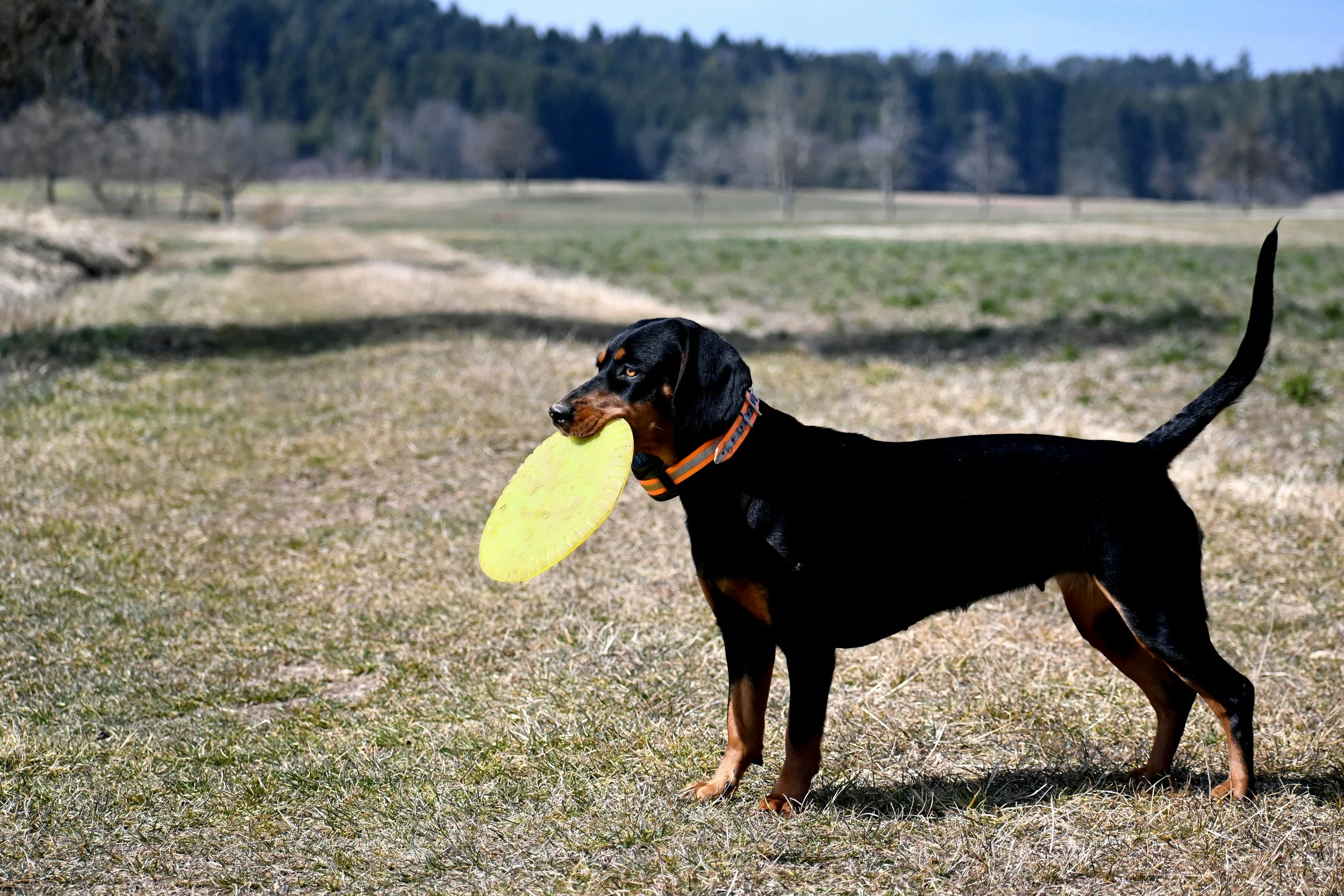Off-Season Conditioning for Your Hunting Bird Dog’s Health
Key Takeaways
Off-season conditioning for your hunting bird dog should focus on building its strength and endurance through activities such as running, swimming, and fetching. This is also a fundamental aspect of preventing injuries and recovery practices.
Mental conditioning and training are just as crucial as your bird dog’s physical fitness. Engage them in puzzle games or other activities that challenge their cognitive abilities.
Hunting dogs should reduce their protein and fat intake during the off-season to help maintain a healthy weight as their activity levels decline. Diets should still offer balanced nutrition.
Hunting dogs are about as integral to Lone Point Cellars as our handcrafted wines. Owners Dana and Jim Divis take pride in raising their family and Vizsla dogs on their property. They’ve enjoyed many hunting adventures with their dogs here over the years, which ultimately inspired the name for Lone Point Cellars. We’re located on a point of a ridge overlooking the Columbia River Valley, where they’d go hunting. Vizslas are even on the label of our vineyard wines!
As bird hunters, we intimately understand the importance of keeping your hunting dog in tip-top shape throughout the year. The off-season is the perfect time to focus on your bird dog’s physical and mental fitness. This will help maintain your dog’s overall health, ensuring they perform at their best when hunting season arrives. From physical conditioning routines to nutrition and hydration, this guide will cover every aspect of off-season conditioning for your hunting bird dog so you’re prepared for your next adventure!
Bird Dog Fitness: Physical Conditioning Routines
Regular exercise is crucial for preparing for the next hunting season. You can’t expect a sedentary dog to perform at a high level! This can lead to injuries during those long days in the field. Exercise will help prevent weight gain during the off-season, build strength, improve cardiovascular endurance, and maintain overall fitness levels. Here are a few great options to consider for your hunting bird dog’s off-season conditioning:
Long Walks and Runs
Running is one of the best ways to maintain your bird dog’s fitness in the off-season! It strengthens their leg muscles, improves joint health, increases stamina and endurance, and helps create a stronger bond between you and your loyal hunting partner. It’s also a critical part of preventing injuries and recovery practices.
Take them on daily runs on various surfaces, such as hills and trails. This will help build different muscles and strengthen their paw pads for rugged terrain. Running through different environments is also great off-season conditioning for your hunting bird dog, helping them maintain their scenting and visual senses.
Nutrition and hydration are essential on hot summer days. Look out for common signs of heat stress – excessive panting, lethargy, disorientation – and make sure they take time to and have water.
Swimming
Swimming is beneficial for physical conditioning routines, as it provides a low-impact, full-body workout for your hunting dog. It’ll help them build muscle strength, improve cardiovascular conditioning, and enhance flexibility, all while reducing pressure on their joints. Swimming also helps hunting dogs build their confidence in the water, enabling them to retrieve birds from lakes and rivers.
Strength Training
Incorporating strength exercises into off-season conditioning for your hunting bird dog not only improves their overall health but also helps prevent injuries and promotes effective recovery practices. Great activities for your bird dog’s fitness include:
Swimming
Running
Stair climbing
Tug of war
“Dog squats” - Have your dog sit and stand, then back again
Mental Conditioning and Training
Mental stimulation is as integral to preparing for the next hunting season as your dog’s physical conditioning routine. It helps:
Maintain your dog’s skills and obedience, including field manners and obedience commands, so they’re more responsive
Strengthen your bond with your dog
Prevent boredom and destructive behaviors due to excess energy
Keep their minds sharp and engaged
Improve their scenting and retrieval skills
So, what can you incorporate into off-season conditioning for your hunting bird dog?
Interactive Games
Make your dog adaptable to the unpredictable nature of the hunt by engaging in interactive games during the off-season. This may include puzzle games, hide-and-seek, and any other activities that challenge their minds. These activities provide mental enrichment and help improve your dog’s problem-solving skills in the field.
Obedience Training
Off-season conditioning for your hunting bird dog should also focus on obedience training. Well-behaved dogs are not only safer but also more effective during hunts. Focus on refining basic commands, such as sit and heel. These should be performed off-lead to build control in the face of outside distractions.
Scent Training
Scent training is a crucial part of your hunting dog’s mental conditioning and training. It helps them enhance their tracking abilities to ensure they can locate game in the field. You can use scented dummies or even real game scents, such as bird feathers, to simulate real hunting conditions. Gradually increase the difficulty of off-season conditioning for your hunting dog by introducing scent trails in various terrains, such as tall grass, or by presenting multiple scent trails simultaneously to challenge their abilities. It’s a great way to provide mental stimulation and improve their hunting skills while preparing for the next hunting season!
Field Training
Field training is excellent off-season conditioning for your hunting bird dog, but it’s essential if you have pointing dogs like Lone Point Cellars’ Dana and Jim. It allows them to refine their natural hunting instincts in a real-world environment, including pointing and holding point, finding game, and steadiness. These skills all help build your bird dog’s fitness and mental prowess for a more successful hunt. Your field training may include:
Practicing advanced obedience commands: point, flush, retrieve, etc.
Distraction training
Scent training
Simulated hunting using decoys and bird launchers
Exposure to different environments, including hunting sounds such as gunshots and bird calls.
Marking and retrieving on land and in water
Steady behavior, teaching your dog to remain still and calm when directed
Nutrition and Hydration
Off-season conditioning for your hunting dog involves more than rigorous physical conditioning routines. Your dog also needs a balanced diet and adequate hydration! They play a vital role in preventing injuries and recovery practices, supporting their physical performance, and maintaining their health.
Hunting dogs should generally transition to a diet that’s lower in protein and fat than their performance food during the hunting season. This helps them maintain a healthy weight as their activity level decreases. Their food should still be balanced, complete with protein, essential fatty acids, vitamins, and minerals. You should consult with your veterinarian to determine the best diet for your dog.
Your dog should always have access to clean, fresh water. Like any other athlete, it’s essential for temperature regulation, muscle function, and overall health. Carry a water bowl and fresh water for your hunting dog during off-season conditioning to prevent dehydration and allow them to cool down.
Preventing Injuries and Recovery Practices
Your bird dog needs to rest and recharge, even while they’re preparing for the next hunting season. You want to avoid overexertion and encourage recovery with:
Regular Breaks - Training shouldn’t be 24/7. Allow them to take regular breaks during physical and mental conditioning and training. They should also have rest and recovery days.
Vet Check-Ups - Schedule routine vet visits to monitor your bird dog’s health and fitness.
Socialization - Expose your dog to different animals, people, and environments to reduce anxiety and reduce the risk of fear-based behaviors that can lead to injuries.
Physical Activity - Off-season conditioning for your hunting dog should include a variety of activities to prevent repetitive motion injuries.
Nutrition and Hydration - Balanced diets help support their overall health.
Off-Season Conditioning for Your Hunting Dog at Lone Point Cellars
Mental and physical conditioning routines are crucial for maintaining your bird dog’s fitness, building their skills, and preventing injuries. But don’t forget that your hunting companion needs their rest, too!
We suggest a visit to Lone Point Cellars! Nestled in the heart of North Central Washington, our region is home to beautiful rivers, parks, and outdoor space that’s perfect for your hunting dog’s off-season conditioning. And once you’re done for the day, you and your dog can rest and relax in one of our stunning dog-friendly Cottages or RV sites. Plan your getaway!





